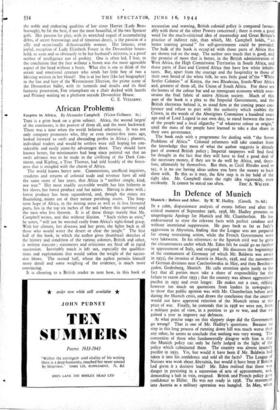African Problems
Empire in Africa. By Alexander Campbell. (Victor Gollancz. 6s.) THIS is a grim book on a grim subject. Africa, the second largest of the continents, is the poorest of them all, and the most backward. There was a time when the world believed otherwise. It was not only company promoters who, fifty or even twenty-five years ago, looked forward to swift and abounding profits in Africa ; planters, individual traders and would-be settlers were still hoping for con- siderable and easily come-by advantages there. They should have known better, for missionaries had long since pointed out that no swift advance was to be made in the civilising of the Dark Con- tinent, and Kipling, a True Thomas, had told frankly of the fierce- ness that is mingled with the charm of Africa.
The world knows better now. Commissions, unofficial inquirers, residents and returns of colonial trade and revenue have all told the same story of late years, that Africa is " neither simple, kind, nor true." Her most readily accessible wealth has lain hitherto in her slaves, her forest produce and her mines. Slaving is done with ; forest produce has been squandered, and, though the mines are flourishing, mines are of their nature perishing assets. The long- term hope of Africa, in the mining areas as well as in less favoured parts, lies in the top six inches of the soil (where this survives) and the men who live thereon. It is of these things mainly that Mr. Campbell 'writes, and this without illusion. " Such riches as exist," he notes, " will not be wrested easily from Africa's tight-fisted grasp. With her climate, her diseases and her pests, she fights back at all those who would water the desert or clear the jungle." The first half of the book, in which the author gives thumbnail sketches of the history and condition of the various colonies, British and other, is written staccato ; statements and criticisms are fired off in rapid succession. Inevitably much is left out, especially the qualifica- tions and explanations that would soften the weight of the succes- sive blows. The second half, where the author permits himself more detail and some weighing of the evidence, is much more convincing.
It is cheering to a British reader to note how, in this book of accusation and warning, British colonial policy is compared favour- ably with those of the other Powers concerned; there is even a good word for the much-criticised idea of trusteeship and Great Britain's practice of indirect rule, than which, Mr. Campbell holds, " no better training ground " for self-government could be provided. The bulk of the book is occup:ed with those parts of Africa that are shown red on the map. The author sees much that is good, and the promise of more that is better, in the British administration of West Africa, the High Commission Territories in South Africa, and those parts of East and Central Africa that have few white inhabi- tants. But, apart from the courage and the hospitality to those of their own breed of the white folk, he sees little good in'the " White Settler Colonies " of Kenya, the two Rhodesias, South-West Africa and, greatest of them all, the Union of South Africa. For these are the.homes of the colour bar and an immigrant economy which over- strains the frail fabric of native African society. Much of this part of the book is a plea to the Imperial Government, and the British electorate behind it, to stand firm at the coming peace con- ference and refuse to part with the authority which enables the Crown, in the words of the Aborigines Committee a hundred years ago and of Lord Lugard in our own day, to stand between the mass of the people and a local oligarchy " of whatever colour or origin," until the mass, of the people have learned to take a due share in their own governance.
The book ends with a programme for dealing with " the Seven Problems of Africa." Colonial reformers will take comfort from the knowledge that most of what the author suggests is already part of avowed British policy ; Imperial taxpayers will find food for thought in the fact that they will have to find a good deal of the necessary money, if they are to do well by Africa, and, there- fore, ultimately by themselves. But then, as Cecil Rhodes used to say, it is no use having ideas unless you have the money to back them with. Be this as it may, the first step is to lay hold of the right idea. Mr. Campbell states the right idea vigorously, even stridently. It cannot be stated too often. Elm A. WALKER.


























 Previous page
Previous page